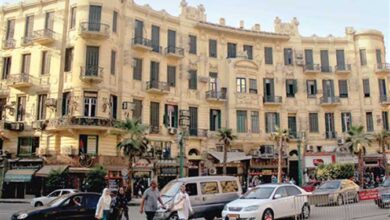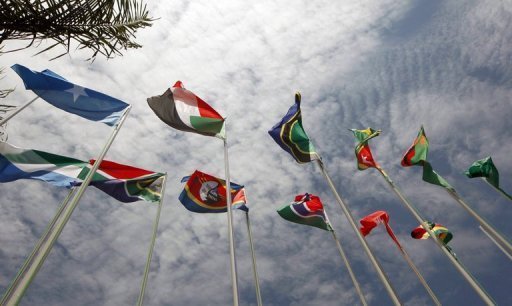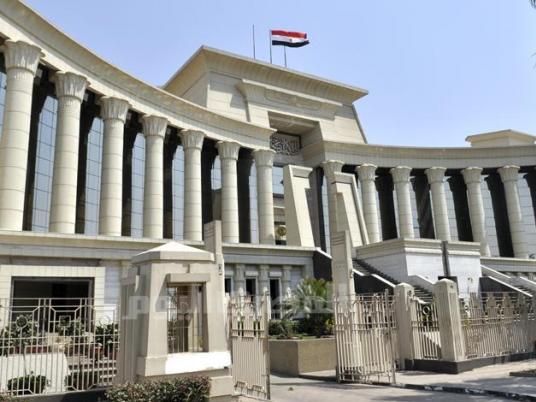In an unprecedented move, privately owned papers including Al-Watan, Al-Tahrir, Youm7 and Al-Wafd share the same front-page headline: “No to dictatorship,” with a hint at the bottom saying the press strike will take place Tuesday in protest of restricted freedoms in the draft constitution.
The entire front pages of all three papers are dedicated to an expressive, embodied image of a prisoner — representing the press — who is sitting hopelessly in a jail cell with his legs chained together.
Monday’s papers reveal that tensions have reached a boiling point after thousands of President Mohamed Morsy’s supporters protested Sunday in front of the Supreme Constitutional Court to prevent judges from entering the building.
The SCC was supposed to review lawsuits challenging the formation of the Constituent Assembly, Egypt’s constitution-drafting body, and the Shura Council, the upper house of Parliament, which are immunized from dissolution against future court orders by Morsy’s recent decrees.
Independent daily Al-Tahrir publishes the statement issued by the SCC as stating, “Judges have indefinitely suspended all the court’s sessions” until they could safely resume them, while also describing Sunday’s events as a “dark day in the history of the Egyptian judiciary.”
Blocking the SCC is part of the Islamists’ political maneuvers to expose the judiciary to psychological pressure after setting up a showdown over the president’s controversial 22 November constitutional declaration that grants him sweeping powers and undermines the rule of law.
In two-page spread, Al-Watan runs a focus file titled “The Constitutional [Court] under siege,” comprised of in-depth features and opinion pieces that mostly condemn the stance of the president and his Islamist allies toward the judiciary.
The paper also states that about 5,000 protesters staged a sit-in in front of the SCC, while chanting anti-judge slogans and shouting “God is great.” Pro-Morsy rallies demanded the dissolution of the court and threatened to set the courthouse on fire, the report adds.
The article goes on to mention that tight security measures were imposed around the court building in the early hours of the morning, including the deployment of 25 Central Security Forces vehicles, but that there was a sudden withdrawal from the scene after the situation intensified. The security vacuum reportedly led to a chaotic scene in which reporters for Al-Watan and Youm7 papers were attacked by protesters, and one of the cameras of the CBC channel was damaged.
In response, 18 political parties and movements released a statement calling on Tahrir protesters to stage peaceful demonstrations in front of the presidential palace against Morsy’s constitutional declaration and the public referendum on the recent drafted constitution, which is scheduled for 15 December, Youm7 says.
The partisan Al-Wafd newspaper rings alarm bells over the possible outbreak of civil war in the country, placing all the blame on the Islamists’ deliberatively manipulative politics that widen the rifts between different segments of society. In a different story, Al-Wafd cites an article published in The New York Times providing an analysis to what it describes as the Islamists’ overt tactical approach to threaten all opposition forces, including the judiciary, that allegedly hinder the democratic process.
The recently established daily Al-Sabah writes that the Judges Club is considering not supervising the referendum as a first act of escalation in response to the fierce campaign against judicial independence.
Despite the ominous situation, Freedom and Justice, the mouthpiece of the Muslim Brotherhood’s political arm, insists on painting a rosy picture of the country’s recent desperate plights.
“The street welcomes the referendum on the constitution … and 8,000 judges are ready for supervision,” reads a top headline on Freedom and Justice’s front page.
The paper continues to adopt victorious language in its coverage of Islamist mass demonstrations, dubbing them as “the renaissance million-man protest” and saying they breathed life into the revolution.
Egypt’s papers:
Al-Ahram: Daily, state-run, largest distribution in Egypt
Al-Akhbar: Daily, state-run, second to Al-Ahram in institutional size
Al-Gomhurriya: Daily, state-run
Rose al-Youssef: Daily, state-run
Al-Dostour: Daily, privately owned
Al-Shorouk: Daily, privately owned
Al-Watan: Daily, privately owned
Al-Wafd: Daily, published by the liberal Wafd Party
Youm7: Daily, privately owned
Al-Tahrir: Daily, privately owned
Al-Sabah: Daily, privately owned
Freedom and Justice: Daily, published by the Muslim Brotherhood's Freedom and Justice Party
Sawt al-Umma: Weekly, privately owned
Al-Arabi: Weekly, published by the Nasserist Party
Al-Nour: Official paper of the Salafi Nour Party



